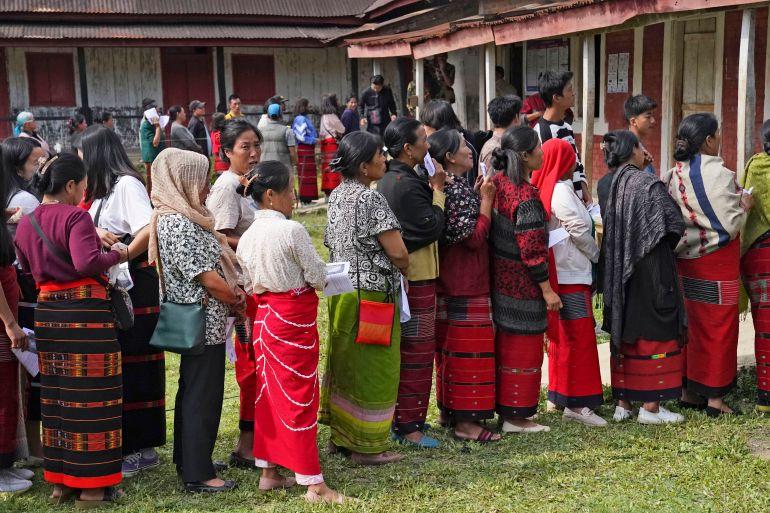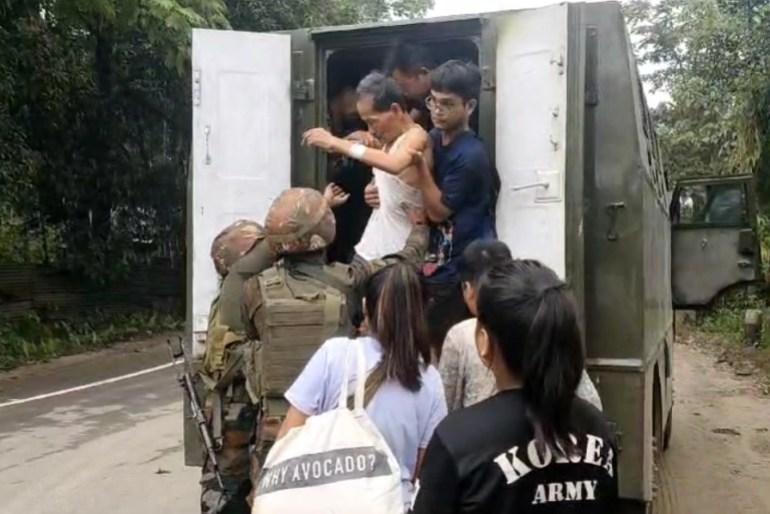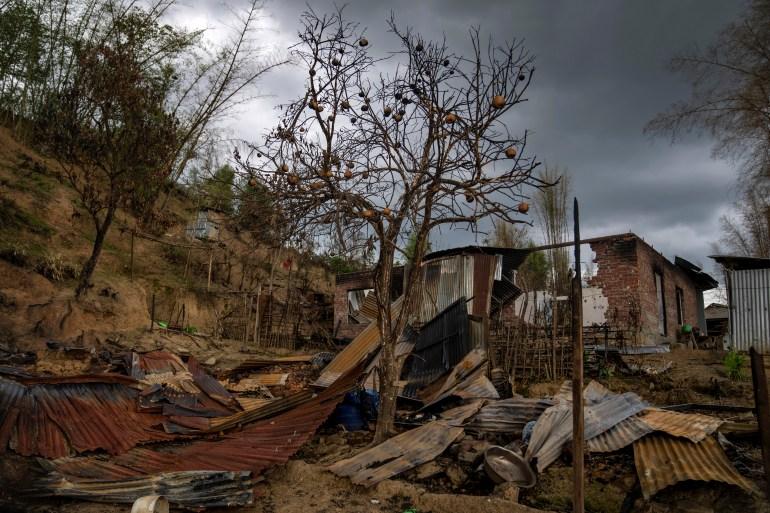Source: ALJAZEERA
ALJAZEERA MEDIA NETWORK

Hopes for peace in conflict-stricken Manipur are quickly dashed as deadly conflicts persist despite the ruling party's election loss.
Jiribam/Chennai, India – On the night of June 6, Thangman Guite, a 26-year-old school teacher, received a distressing call after finishing her dinner.
"They are coming, hide," was all she heard.
Similar calls were made to other residents in Vengnuam, a village located in Manipur state's Jiribam district, bordering Assam in northeast India.
Immediately, Guite turned off her house lights and instructed about 15 villagers gathered outside to head towards the nearest house to the forest, with their phones switched off.
As they gathered in one room, they heard voices and gunshots, as two vehicles with armed men from the local militia, Arambai Tenggol, entered the village.
The villagers fled to the forest, quietly and in fear. Guite recalled flashes of those killed during the ethnic violence that has plagued Manipur since May last year.
"Honestly, I thought we wouldn't survive," Guite told Al Jazeera. Within an hour, their village was engulfed in smoke.
By the following morning, Indian army soldiers arrived to control the violence.

Guite found her house among many others burnt to ashes. The church she attended every Sunday was also destroyed.
A 40-year-old man was reported missing and believed abducted by the village residents.
The Vengnuam incident exemplifies the ethnic conflict in Manipur, involving the majority Hindu Meitei community and the primarily Christian Kuki-Zo tribe. These clashes have claimed over 220 lives and displaced 67,000 people according to the government.
The attack came after tensions rose in Jiribam following the discovery of a decomposed body of a Kuki-Zo youth, Seigoulen Singson, who had been missing since May 14.
On June 6, two days after the Indian National Congress party defeated the ruling Bharatiya Janata Party (BJP) in Manipur's parliamentary seats, the body of 59-year-old Meitei man Soibam Saratkumar Singh was found after being missing for over a week.
The Meitei community accused the Kuki-Zo of the murder, which Kuki-Zo leaders denied, instead blaming rival Meitei armed groups.
After the Vengnuam arson news spread, Meitei residents feared retaliation and sought help from authorities to move to safety. Soon, Lamtai Khunou, a Meitei village, was set on fire.

A Kuki-Zo group called the burning of Lamtai Khunou and two other Meitei villages "retribution against Arambai Tenggol who initiated these violent acts." The tribals expressed a resolve to not remain silent in the face of aggression.
As of this report, more than 1,000 people from both Meitei and Kuki-Zo communities in Jiribam have been displaced – the Kuki-Zo moved to Assam by the army, and the Meitei relocated to relief camps.
 Manipur
Manipur
Despite Prime Minister Narendra Modi's return to power for a third term on June 4, tensions in Manipur remain high. Critics accuse the BJP, which heads Manipur's state government, of exploiting the violence for political ends, a charge the party denies. Many in the state saw the BJP's election loss as a rejection of its role in the ongoing violence.
Guite told Al Jazeera that voting was important to express her discontent with the government's failure to stop the killings. However, the hope stemming from the election results diminished for her following the Vengnuam attack.
On June 8, as the Indian army escorted her and other Kuki-Zo to a relief camp in Assam, she realized the futility of the electoral change celebrations.
"My people have suffered under BJP rule, who we blame for this violence. The election results made us believe change was possible, but it felt lost after the attack," she said.
Manipur has long experienced tensions between the Meiteis, who form about 60 percent of the population concentrated in the valley areas, and the minority Kuki-Zo and Naga tribes in the surrounding hills.
India’s constitution provides affirmative action programs for historically marginalized tribes, including education and job quotas under the Scheduled Tribe (ST) status. For nearly a decade, the Meiteis have demanded ST status, opposed by the tribes.
In March 2023, a local court recommended extending ST status to the Meiteis, a decision rescinded in February this year. This sparked events leading to one of India’s worst civil conflicts. As tribes protested against the court order, fears of a Meitei backlash grew.

On May 3 last year, suspected Meitei individuals burned a gate commemorating a Kuki-Zo rebellion against British colonial rule in Churachandpur hill district, resulting in deadly riots.
Within weeks, Meiteis in the hill districts were evacuated by the army to the valley. Meanwhile, hundreds of Kuki-Zo fled Imphal, with many being lynched and their villages burned. Tens of thousands were displaced, marking the highest internal displacement in South Asia this year according to a Geneva-based report.
 India Manipur Ethnic Clashes
India Manipur Ethnic Clashes
The violence led to the general election in Manipur being held in two phases. Despite heavy security, incidents of violence and alleged vote rigging forced repolling.
On April 19, Sarah Takhelmayum*, a 21-year-old social worker, was among the first voters in Moirang, part of the Inner Manipur constituency.
Upon returning home, she heard about violence at polling booths. Videos of voters fleeing amidst gunshots circulated on social media.
Takhelmayum's mother insisted on voting despite the unrest, even as gunshots and militia vehicles roamed the area.
"By 10am, people were openly expressing resentment against the BJP," Takhelmayum said, adding it was the first time she saw public opposition to the ruling party.
She questioned the purpose of armed militias acting as saviors in Imphal Valley during elections.
On April 19, the Congress accused armed groups of "mass violence and booth capturing in the valley". Witnesses claimed Arambai Tenggol members were forcing people to vote for the BJP, an allegation the party denied.
In the Inner Manipur seat, BJP candidate Basanta Kumar Singh was defeated by Congress’s Bimol Akoijam by over 100,000 votes.
Though many didn’t expect the BJP's defeat in Manipur, Takhelmayum expressed surprise at the results.
"We felt powerless against the BJP's muscle and notoriety in Manipur," she told Al Jazeera.
Local editor Biju Samom said growing resentment against the BJP's failure to restore peace influenced the election results, marking a shift towards new political dynamics led by younger, deserving individuals.
Independent researcher Siam Thangsing noted that Kuki-Zo voters, angered by their forced displacement, were set against the BJP despite the majority of their legislators being from the party.
Congress parliamentarian Alfred Kanngam S Arthur, who won the Outer Manipur constituency, said the results would shed light on the state’s struggles.
NPF president Awangbow Newmai, however, did not blame the BJP government for the election loss, acknowledging efforts to control violence while respecting democratic mandates.
As the BJP returns to power in New Delhi, questions arise about their approach to the Manipur crisis and whether Chief Minister N Biren Singh will remain in office.
Researcher Thangsing worries that the newly-elected Congress representatives may not support the Kuki-Zo community, given the party's past stance.
“How Congress addresses this contradiction could potentially determine if they will work towards ending the conflict,” Thangsing said.
*Name changed to protect identity due to fear of reprisal
Your email address will not be published. Required fields are marked *